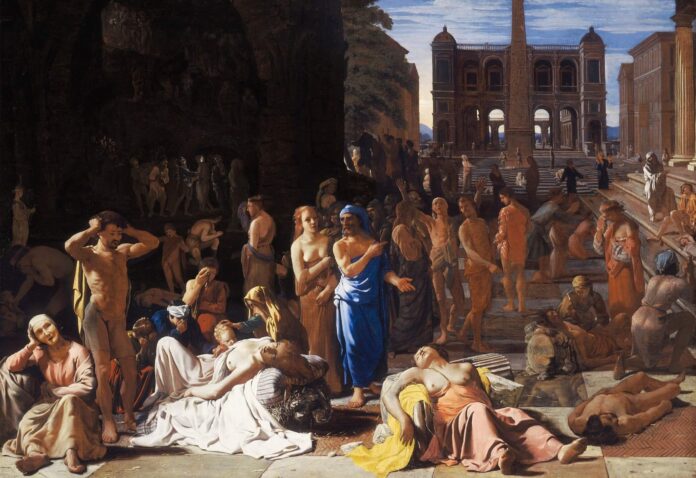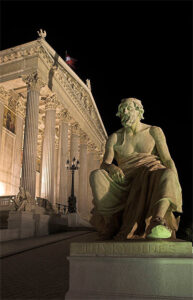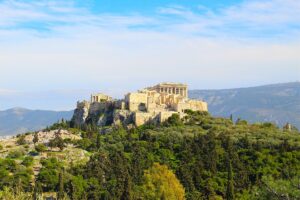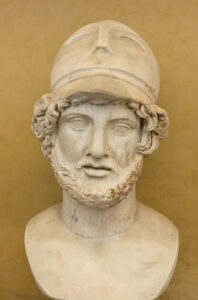
Thucydides of Athens, the writer of the Peloponnesian War, would be pleased. His book is still used by those who try to better understand our contemporary world. During the Cold War, his work was read in order to elucidate the bipolar world-order and in particular to forecast the possible outcome of the USA–USSR conflict. The latter, not unlike Thucydides’ Sparta, was a totalitarian and continental empire at odds with a democratic one, which largely depended on its mobile forces and its powerful navy. Just like Athens 2400 years earlier. In recent years, “Thucydides’ trap” became a fashionable idea in foreign policy theory. Following his interpretation of the origins of the Athenian–Spartan conflict, it is claimed that whenever a rising superpower threatens an old empire war is all but inevitable. Interestingly, this time the U.S. is supposed to be Sparta whereas China represents Athens. Along these lines, some political pundits prophesize the inevitable decline and fall of America. They seem to forget that the rising power actually lost the Peloponnesian War.

The Great Plague
But Thucydides can also teach us a lot about the pandemic of our time. The first clinical account of an epidemic can be found in the Peloponnesian War (tr. Rex Warner):
“The plague originated, so they say, in Ethiopia in upper Egypt, and spread from there into Egypt itself and Libya and much of the territory of the King of Persia. In the city of Athens it appeared suddenly, and the first cases were among the population of Piraeus […]. Later, however, it appeared also in the upper city, and by this time the deaths were greatly increasing in number. As to the question of how it could first have come about or what causes can be found adequate to explain its powerful effect on nature, I must leave that to be considered by other writers, with or without medical experience. I myself shall merely describe what it was like, and set down the symptoms, knowledge of which will enable it to be recognized, if it should ever break out again. I had the disease myself and saw others suffering from it. […] People in perfect health suddenly began to have burning feelings in the head; their eyes became red and inflamed; inside their mouths there was bleeding from the throat and tongue, and the breath became unnatural and unpleasant. The next symptoms were sneezing and hoarseness of voice, and before long the pain settled on the chest and was accompanied by coughing. Next the stomach was affected with stomach-aches and with vomitings of every kind of bile that has been given a name by the medical profession, all this being accompanied by great pain and difficulty. […] Some died in neglect, some in spite of every possible care being taken of them. As for a recognized method of treatment, it would be true to say that no such thing existed: what did good in some cases did harm in others. […] Terrible, too, was the sight of people dying like sheep through having caught the disease as a result of nursing others. This indeed caused more deaths than anything else. For when people were afraid to visit the sick, then they died with no one to look after them […]. When, on the other hand, they did visit the sick, they lost their own lives, and this was particularly true of those who made it a point of honour to act properly. Such people felt ashamed to think of their own safety and went into their friends’ houses at times when even the members of the household were so overwhelmed by the weight of their calamities that they had actually given up the usual practice of making laments for the dead.”

Social and Moral Consequences of the Plague
Thucydides was even more interested in the social and even moral outcome of the plague than in its medical description. He focused on the decay of the social bonds, on the vanishing faith in the society and in the state, in humanity and in the gods.
“For the catastrophe was so overwhelming that men, not knowing what would happen next to them, became indifferent to every rule of religion or of law. All the funeral ceremonies which used to be observed were now disorganized, and they buried the dead as best they could. Many people, lacking the necessary means of burial because so many deaths had already occurred in their households, adopted the most shameless methods. They would arrive first at a funeral pyre that had been made by others, put their own dead upon it and set it alight; or, finding another pyre burning, they would throw the corpse that they were carrying on top of the other one and go away. In other respects also Athens owed to the plague the beginnings of a state of unprecedented lawlessness. Seeing how quick and abrupt were the changes of fortune which came to the rich who suddenly died and to those who had previously been penniless but now inherited their wealth, people now began openly to venture on acts of self-indulgence which before then they used to keep dark. Thus they resolved to spend their money quickly and to spend it on pleasure, since money and life alike seemed equally ephemeral. […] No fear of god or law of man had a restraining influence. As for the gods, it seemed to be the same thing whether one worshipped them or not, when one saw the good and the bad dying indiscriminately. As for offences against human law, no one expected to live long enough to be brought to trial and punished: instead everyone felt that already a far heavier sentence had been passed on him and was hanging over him, and that before the time for its execution arrived it was only natural to get some pleasure out of life.”
In the light of Thucydides’ description, the most challenging task in the pandemic is not so much healing the bodies of those infected with the virus but defending and rebuilding the society. What is particularly important is maintaining and restoring the system of values responsible for the very workings of human communities. What I mean is values that duly protect the needs, the rights, and the interests of individuals, but without threatening the security of other human beings and without undermining the effectiveness of the state.

Pericles’ Trap
In Thucydides, the plague is described immediately after another memorable episode of his narrative. During the public burial of the soldiers fallen in the first campaigns of the Peloponnesian War the funerary oration was delivered by Pericles, the leader of the Athenian democracy. We do not know what he actually said. Thucydides claims that he discarded the traditional praise of the fallen and replaced it with a tribute to the Athenian democracy itself. What we have here is a paradigm that inspired democratic and liberal thinkers ever since the late 18th century. In a nutshell, it is an ideal of an equilibrium between the needs of the state on the one hand and the ambitions and liberties of the individual on the other.
Pericles’ speech is grand but sounds entirely persuasive. The point is that this ideal did not stand the test of the plague, which broke out instantly. Its account is an almost apocalyptic view of the sudden degradation of the society and of the morality of individual citizens. Under the pressure of the unprecedented calamities, the fear of gods and the laws of man yielded to the selfishly brutal human nature. This very contrast between the noble ideal of the Athenian democracy and the instantaneous fall of all its values contributes to a more general lesson Thucydides wanted to convey to his public.

For Thucydides’ reader today it seems obvious that the plague must have been instrumental in his life and in his work. He survived the disease himself. Its description constitutes a crucial part of his narrative. And it must have been the same for his life and his bitter experience of history. With the Athenian plague, the old and relatively predictable world came to an abrupt end. Athens was decimated and her strategic position against Sparta fundamentally weakened. Due to the relentless energy of the Athenians, their empire could successfully fight on for more than twenty years but it was ultimately crushed.
For Thucydides, however, there was more to it than just the strategic consequences of the pandemic. Soon after his account of the plague, he mentions the death of one of its prominent victims, Pericles himself. At this occasion, he speaks highly of his strategic genius and of his unrivaled political talent. In the eyes of the historian, Pericles was the best imaginable leader of the Athenian democracy. He was also able to predict and anticipate important historical developments. This is why he was determined to provoke the war with the Spartans once he clearly saw that it was inevitable.
At first sight, the praise of Pericles amounts to an ideal of a statesman. Still, in Thucydides’ narrative it fades in discord. It is here that the reader first has the chance to understand that the ultimate fall of Athens was actually due to the political (mis)calculations of the most astute among the Greek politicians thus far. Now, Pericles’ ingenious war-plan was to defend Athenian possessions on the land while at the same time using its navy and its marine corps to ceaselessly attack the enemy on his own turf. However, none of his political heirs had his political skills and his command of the hearts and minds of the Athenian people to make this possible. Without Pericles, Athens was doomed to fail.

Thucydides in the Time of Plague
So, what can Thucydides actually teach us in the time of plague? Obviously, one cannot help being overwhelmed these days by his breathtaking vision of the clash between the democratic ideal and the social ruin triggered by the virus. More importantly, his description of the pandemic and its social consequences ought to make it possible for us to anticipate the most urgent “non-medical” challenges and tasks of the state and of us all during the virus’ attack and once it is over. But the most important lesson of the Peloponnesian War addresses, as he suggests it in the preface of his book, responsible politicians and reasonable citizens of the future. This is us. Now.
A month ago, with a group of friends we celebrated the birthday of one of the most perspicacious political analysts in my country. At this occasion, he presented a brilliantly cogent but duly cautious analysis of possible scenarios for our contorted political life in the months to come. All these scenarios, just like those conceived by a multitude of less clever commentators, were thwarted in the course of a single month by, as Thucydides would most probably put it, “the incalculable element” (ho paralogos in his Greek). What I mean is not pure chance. Far from that. At this point, the virus was already at large in China and beyond. We were unaware of the mortal danger to our world, although we had every data we needed. But we did not stand a chance to anticipate its spread and its devastating consequences.
It seems that Thucydides is perfectly suited to our times. There are so many factors around us which do not just make our future unforeseeable. By virtue of the perils that loom on the horizon, they make our communal and individual decisions more and more irreversible and final. Suffice it to mention the impending ecological disaster hovering overhead. The true “trap of Thucydides” may be that in our political life today we have to assume that we still can change our future thanks to our human ingenuity, but at the same time we need to bear in mind just how many phenomena around us elude our judgement. The time calls for brave and radical solutions, but each of them, if undertaken in a wrong moment or based on faulty premises, can irrevocably worsen our current situation. If this dramatic tension becomes clear to us all, Thucydides achieved his goal. The only remaining question is whether Pericles is always doomed to failure.
Marek Węcowski
Marek Węcowski (M.A. Warsaw; Ph.D. with honors, Paris, Ecole des Hautes Etudes en Sciences Sociales) teaches ancient history at the University of Warsaw. He was a junior fellow of Harvard’s Center for Hellenic Studies and Fulbright visiting fellow at Princeton University. His publications include The Rise of the Greek Aristocratic Banquet (Oxford University Press, 2014). The English translation of his recent book on Athenian ostracism (Warsaw, 2018) is in preparation.
A Polish version of this paper was published in “Gazeta Wyborcza” (28.03.2020) in reaction to the article published by Irad Malkin in “Haaretz” (18.03.2020).
Here you can read an analysis on how the numismatic market reacts to Covid-19.





